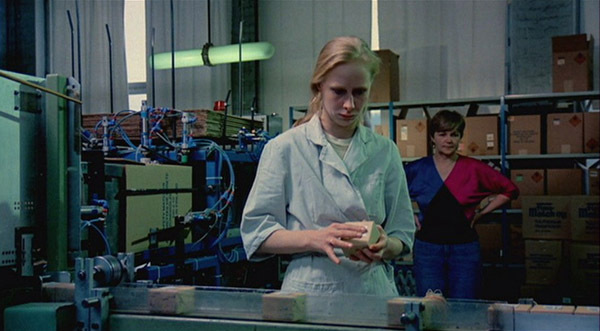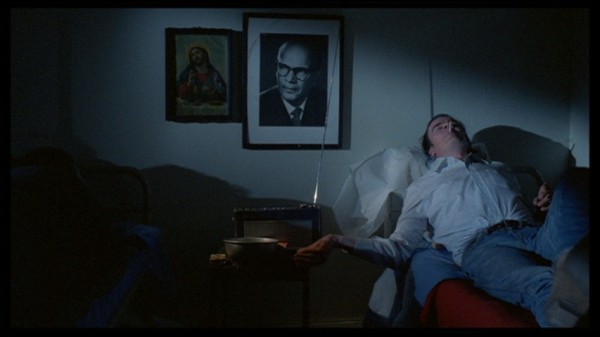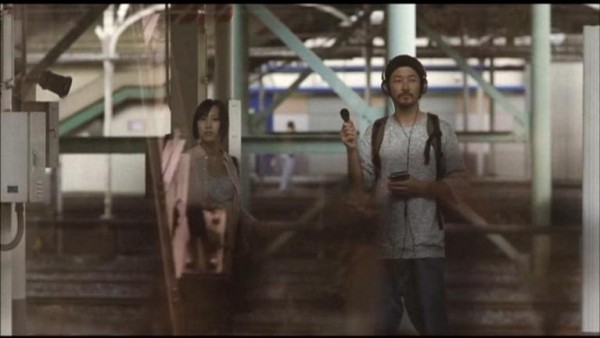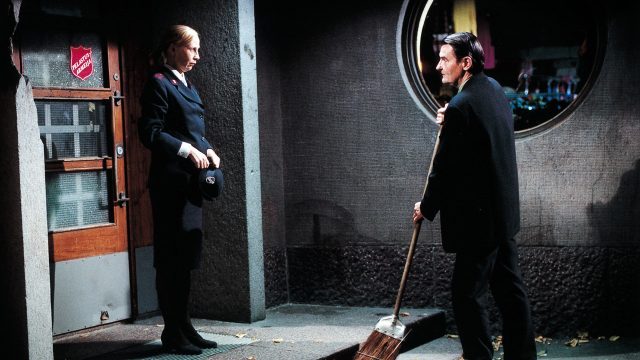
Irma (Kati Outinen) and M (Markku Peltola) face an uncertain future in Aki Kaurismäki’s The Man Without a Past
THE MAN WITHOUT A PAST (Aki Kaurismäki, 2002)
Film Forum
209 West Houston St.
Friday, November 24, 12:30, 2:30, 4:40, 7:00
Tuesday, November 28, 12:30, 4:50, 7:00
Series runs November 24-30
filmforum.org
www.sonyclassics.com
 In conjunctions with the December 1 opening of Finnish auteur Aki Kaurismäki’s latest work, The Other Side of Hope, which earned him the Silver Bear for Best Director at the Berlin International Film Festival, Film Forum is showing five of his previous tales, the four included here as well as his Paris-set La Vie de Bohème. Kaurismäki’s touching, funny, dark, and satiric The Man Without a Past deservedly won the 2002 Grand Jury Prize at Cannes. In the brutal opening, an unidentified character gets severely beaten and dies, then wakes up with amnesia. M (Markku Peltola) is soon taken in by a desperately poor family who lives in a shack they call a container. He meets Irma (Kati Outinen, in a small role that won her Best Actress at Cannes), and their potential romance is both sweet and absurd. Kaurismäki wrote, produced, and directed this splendid example of the offbeat nature of his work, which is always intelligent, challenging, and rewarding. It is screening at Film Forum on November 24 and 28.
In conjunctions with the December 1 opening of Finnish auteur Aki Kaurismäki’s latest work, The Other Side of Hope, which earned him the Silver Bear for Best Director at the Berlin International Film Festival, Film Forum is showing five of his previous tales, the four included here as well as his Paris-set La Vie de Bohème. Kaurismäki’s touching, funny, dark, and satiric The Man Without a Past deservedly won the 2002 Grand Jury Prize at Cannes. In the brutal opening, an unidentified character gets severely beaten and dies, then wakes up with amnesia. M (Markku Peltola) is soon taken in by a desperately poor family who lives in a shack they call a container. He meets Irma (Kati Outinen, in a small role that won her Best Actress at Cannes), and their potential romance is both sweet and absurd. Kaurismäki wrote, produced, and directed this splendid example of the offbeat nature of his work, which is always intelligent, challenging, and rewarding. It is screening at Film Forum on November 24 and 28.
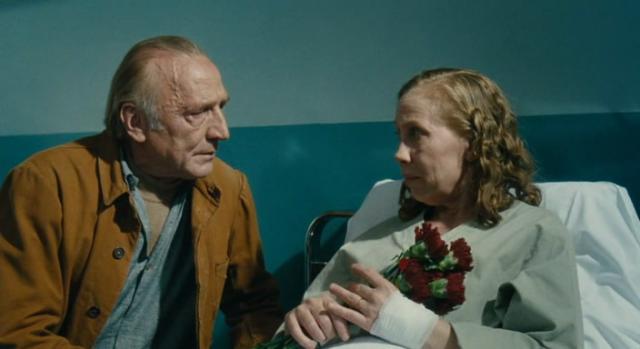
Marcel (André Wilms) and Arletty Marx (Kati Outinen) face life with a deadpan sense of humor in Aki Kaurismäki’s Le Havre
LE HAVRE (Aki Kaurismäki, 2011)
Saturday, November 25, 12:30, 2:30, 4:30, 8:45
Monday, November 27, 3:50
Thursday, November 30, 12:30, 2:30, 4:45, 7:00, 9:10
janusfilms.com/lehavre
filmforum.org
 For more than thirty years, Finnish auteur Aki Kaurismäki (Leningrad Cowboys Go America, Drifting Clouds) has been making existential deadpan black comedies that are often as funny as they are dark and depressing. Has there ever been a film as bleak as 1990’s The Match Factory Girl, in which a young woman (Kati Outinen) suffers malady after malady, tragedy after tragedy, embarrassment after embarrassment, her expression never changing? In his latest film, the thoroughly engaging Le Havre, Kaurismäki moves the setting to a small port town in France, where shoeshine man Marcel Marx (André Wilms), a self-described former Bohemian, worries about his seriously ill wife (Outinen) while trying to help a young African boy (Blondin Miguel), who was smuggled into the country illegally on board a container ship, steer clear of the police, especially intrepid detective Monet (Jean-Pierre Darroussin), who never says no to a snifter of Calvados. Adding elements of French gangster and WWII Resistance films with Godardian undercurrents — he even casts Jean-Pierre Léaud in a small but pivotal role — Kaurismäki wryly examines how individuals as well as governments deal with illegal immigrants, something that has taken on more importance than ever amid the growing international economic crisis and fears of terrorism. Through it all, Marcel remains steadfast and stalwart, quietly and humbly going about his business, deadpan every step of the way. Wouter Zoon’s set design runs the gamut from stark grays to bursts of color, while longtime Kaurismäki cinematographer Timo Salminen shoots scene after scene with a beautiful simplicity. Winner of a Fipresci critics award at Cannes and Finland’s official entry for the Best Foreign Language Film Oscar, Le Havre, the first of a proposed trilogy, is another marvelously unusual, charmingly offbeat tale from a master of the form. A selection of the 2011 New York Film Festival, Le Havre is screening at Film Forum on November 25 and 27.
For more than thirty years, Finnish auteur Aki Kaurismäki (Leningrad Cowboys Go America, Drifting Clouds) has been making existential deadpan black comedies that are often as funny as they are dark and depressing. Has there ever been a film as bleak as 1990’s The Match Factory Girl, in which a young woman (Kati Outinen) suffers malady after malady, tragedy after tragedy, embarrassment after embarrassment, her expression never changing? In his latest film, the thoroughly engaging Le Havre, Kaurismäki moves the setting to a small port town in France, where shoeshine man Marcel Marx (André Wilms), a self-described former Bohemian, worries about his seriously ill wife (Outinen) while trying to help a young African boy (Blondin Miguel), who was smuggled into the country illegally on board a container ship, steer clear of the police, especially intrepid detective Monet (Jean-Pierre Darroussin), who never says no to a snifter of Calvados. Adding elements of French gangster and WWII Resistance films with Godardian undercurrents — he even casts Jean-Pierre Léaud in a small but pivotal role — Kaurismäki wryly examines how individuals as well as governments deal with illegal immigrants, something that has taken on more importance than ever amid the growing international economic crisis and fears of terrorism. Through it all, Marcel remains steadfast and stalwart, quietly and humbly going about his business, deadpan every step of the way. Wouter Zoon’s set design runs the gamut from stark grays to bursts of color, while longtime Kaurismäki cinematographer Timo Salminen shoots scene after scene with a beautiful simplicity. Winner of a Fipresci critics award at Cannes and Finland’s official entry for the Best Foreign Language Film Oscar, Le Havre, the first of a proposed trilogy, is another marvelously unusual, charmingly offbeat tale from a master of the form. A selection of the 2011 New York Film Festival, Le Havre is screening at Film Forum on November 25 and 27.
THE MATCH FACTORY GIRL (TULITIKKUTEHTAAN TYTTÖ) (Aki Kaurismäki, 1990)
Monday, November 27, 12:30, 5:50, 7:30
filmforum.org
 Finnish director Aki Kaurismäki completes his conceptual Proletariat Trilogy with the bleakest, most deadpan of the three examinations of working-class life with the wickedly funny, blacker-than-black comedy The Match Factory Girl. The follow-up to 1986’s Shadows in Paradise and 1988’s Ariel, the finale tells the sad story of a poor young woman who just can’t seem to catch a break. Kaurismäki regular Kati Outinen stars as Iris, an assembly-line drone who makes way too much out of a rare one-night stand with the devastatingly disinterested Aarne (Vesa Vierikko), leading to all kinds of problems for her, both professionally and personally. Continuing the subtly dramatic color scheme of the previous two films, cinematographer Timo Salminen, set designer Risto Karhula, and Kaurismäki add sly bursts of blue and orange as things keep getting worse and worse for Iris, who, despite her name, doesn’t really see the world for what it is, instead living in a bizarre kind of fantasy until she decides to do something about it. The Match Factory Girl cemented Kaurismäki’s reputation as one of the most fascinating young international filmmakers, which he’s lived up to with such later favorites as Juha, Cannes Grand Prix winner The Man Without a Past, and Le Havre.The Match Factory Girl is screening November 27 at Film Forum.
Finnish director Aki Kaurismäki completes his conceptual Proletariat Trilogy with the bleakest, most deadpan of the three examinations of working-class life with the wickedly funny, blacker-than-black comedy The Match Factory Girl. The follow-up to 1986’s Shadows in Paradise and 1988’s Ariel, the finale tells the sad story of a poor young woman who just can’t seem to catch a break. Kaurismäki regular Kati Outinen stars as Iris, an assembly-line drone who makes way too much out of a rare one-night stand with the devastatingly disinterested Aarne (Vesa Vierikko), leading to all kinds of problems for her, both professionally and personally. Continuing the subtly dramatic color scheme of the previous two films, cinematographer Timo Salminen, set designer Risto Karhula, and Kaurismäki add sly bursts of blue and orange as things keep getting worse and worse for Iris, who, despite her name, doesn’t really see the world for what it is, instead living in a bizarre kind of fantasy until she decides to do something about it. The Match Factory Girl cemented Kaurismäki’s reputation as one of the most fascinating young international filmmakers, which he’s lived up to with such later favorites as Juha, Cannes Grand Prix winner The Man Without a Past, and Le Havre.The Match Factory Girl is screening November 27 at Film Forum.
ARIEL (Aki Kaurismäki, 1988)
Monday, November 27, 2:10, 9:10
filmforum.org
 More of a conceptual sequel to Shadows in Paradise than a continuing narrative, Ariel stars Turo Pajala as Taisto Kasurinen, a Finnish miner who has just lost his job because the mine has closed. Sitting at a diner with his father/coworker, Taisto barely flinches as the elder Kasurinen tells him that there is nothing for him here, gives him the keys to his white Cadillac convertible, and goes into the bathroom and shoots himself. Taisto, with ever-changing facial hair in the beginning, quickly gets mugged, his meager life savings stolen from him. He seeks day work on the docks and sort of starts dating single mother Irmeli Pihlaja (Susanna Haavisto), who has never met a job she couldn’t quit that day. Taisto soon finds himself in prison for a ridiculous reason — and one he doesn’t really fight, as he generally just sits back and lets things happen to him — and meets fellow inmate Mikkonen (Shadows in Paradise’s Matti Pellonpää), and the two decide it’s time to take action and break out. A very dark, very black comedy that mixes in elements of romance and noir, Ariel is an absurdist existential feast, following Taisto and his compatriots as they make their very strange way through a very bizarre world. Ariel is being shown November 27 at Film Forum with the third part of the Proletariat Trilogy, The Match Factory Girl.
More of a conceptual sequel to Shadows in Paradise than a continuing narrative, Ariel stars Turo Pajala as Taisto Kasurinen, a Finnish miner who has just lost his job because the mine has closed. Sitting at a diner with his father/coworker, Taisto barely flinches as the elder Kasurinen tells him that there is nothing for him here, gives him the keys to his white Cadillac convertible, and goes into the bathroom and shoots himself. Taisto, with ever-changing facial hair in the beginning, quickly gets mugged, his meager life savings stolen from him. He seeks day work on the docks and sort of starts dating single mother Irmeli Pihlaja (Susanna Haavisto), who has never met a job she couldn’t quit that day. Taisto soon finds himself in prison for a ridiculous reason — and one he doesn’t really fight, as he generally just sits back and lets things happen to him — and meets fellow inmate Mikkonen (Shadows in Paradise’s Matti Pellonpää), and the two decide it’s time to take action and break out. A very dark, very black comedy that mixes in elements of romance and noir, Ariel is an absurdist existential feast, following Taisto and his compatriots as they make their very strange way through a very bizarre world. Ariel is being shown November 27 at Film Forum with the third part of the Proletariat Trilogy, The Match Factory Girl.
